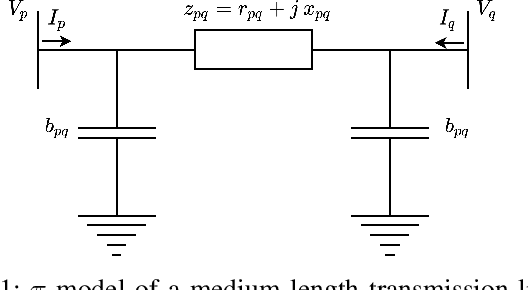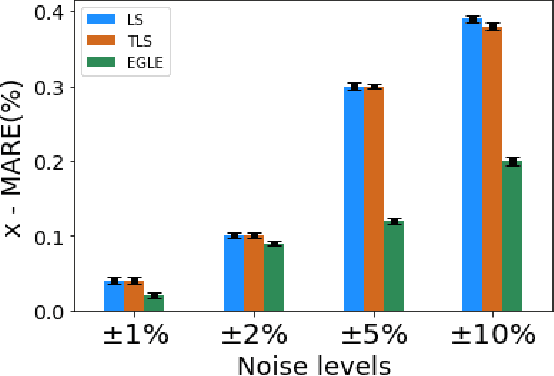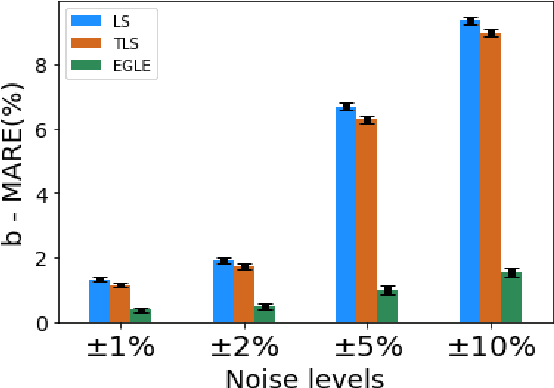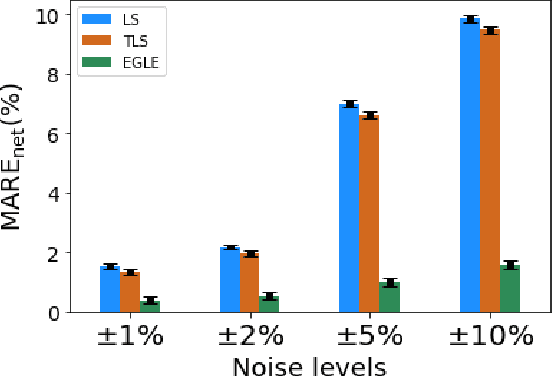Antos Cheeramban Varghese
Development of Reduced Feeder and Load Models Using Practical Topological and Loading Data
May 09, 2025Abstract:Distribution feeder and load model reduction methods are essential for maintaining a good tradeoff between accurate representation of grid behavior and reduced computational complexity in power system studies. An effective algorithm to obtain a reduced order representation of the practical feeders using utility topological and loading data has been presented in this paper. Simulations conducted in this work show that the reduced feeder and load model of a utility feeder, obtained using the proposed method, can accurately capture contactor and motor stalling behaviors for critical events such as fault induced delayed voltage recovery.
Comparative Analysis of Information Theoretic and Statistical Methods for Line Parameter Estimation
Apr 24, 2024Abstract:Recent studies indicate that the noise characteristics of phasor measurement units (PMUs) can be more accurately described by non-Gaussian distributions. Consequently, estimation techniques based on Gaussian noise assumptions may produce poor results with PMU data. This paper considers the PMU based line parameter estimation (LPE) problem, and investigates the performance of four state-of-the-art techniques in solving this problem in presence of non-Gaussian measurement noise. The rigorous comparative analysis highlights the merits and demerits of each technique w.r.t. the LPE problem, and identifies conditions under which they are expected to give good results.
High-Speed State Estimation in Power Systems with Extreme Unobservability Using Machine Learning
Dec 04, 2022



Abstract:Fast timescale state estimation for a large power system can be challenging if the sensors producing the measurements are few in number. This is particularly true for doing time-synchronized state estimation for a transmission system that has minimal phasor measurement unit (PMU) coverage. This paper proposes a Deep Neural network-based State Estimator (DeNSE) to overcome this extreme unobservability problem. For systems in which the existing PMU infrastructure is not able to bring the estimation errors within acceptable limits using the DeNSE, a data-driven incremental PMU placement methodology is also introduced. The practical utility of the proposed approach is demonstrated by considering topology changes, non-Gaussian measurement noise, bad data detection and correction, and large system application.
Transmission Line Parameter Estimation Under Non-Gaussian Measurement Noise
Aug 28, 2022



Abstract:Accurate knowledge of transmission line parameters is essential for a variety of power system monitoring, protection, and control applications. The use of phasor measurement unit (PMU) data for transmission line parameter estimation (TLPE) is well-documented. However, existing literature on PMU-based TLPE implicitly assumes the measurement noise to be Gaussian. Recently, it has been shown that the noise in PMU measurements (especially in the current phasors) is better represented by Gaussian mixture models (GMMs), i.e., the noises are non-Gaussian. We present a novel approach for TLPE that can handle non-Gaussian noise in the PMU measurements. The measurement noise is expressed as a GMM, whose components are identified using the expectation-maximization (EM) algorithm. Subsequently, noise and parameter estimation is carried out by solving a maximum likelihood estimation problem iteratively until convergence. The superior performance of the proposed approach over traditional approaches such as least squares and total least squares as well as the more recently proposed minimum total error entropy approach is demonstrated by performing simulations using the IEEE 118-bus system as well as proprietary PMU data obtained from a U.S. power utility.
 Add to Chrome
Add to Chrome Add to Firefox
Add to Firefox Add to Edge
Add to Edge